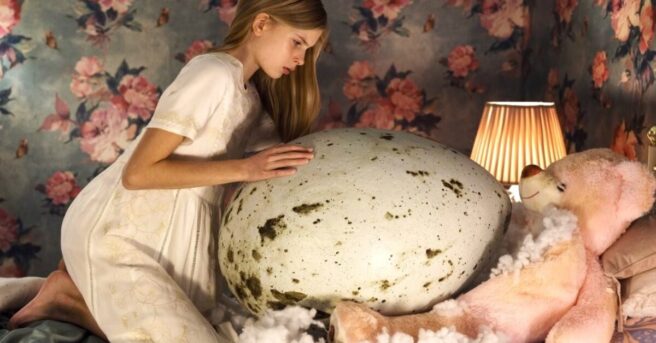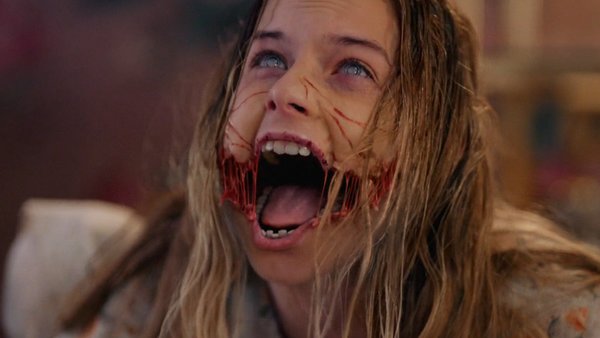Being a mother is viewed as this wonderful, important thing. What occurs, though, if it isn’t? That is precisely what Hannah Bergholm’s first horror film analyses. In “Hatching,”
Tinja, a 12-year-old girl, tells her narrative of trying to live up to her mother’s expectations of perfection. Tinja chooses to carry home an abandoned egg she discovers in the woods one day. But Tinja’s life is shaken by this selfless gesture of generosity.
Nurture Evil – Hatching (2022)

The film’s eerie, “body-horror” concept is immediately established in the opening shot. A young girl is stretching, her back facing us, and the contour of her spine can be seen in agonising detail. In what looks to be phone footage, her mother quickly enters the frame. Then, we meet Matias, her brother, and her father. They appear perfect at first glance. Tinja is pursuing a career as a professional gymnast, her mother is a social influencer who chronicles the daily life of a typical Finnish family, her father is a successful architect, and her brother is the loveliest youngster. They give a performance for a vlog, which they end rather ironically:
“I hope your everyday life is as lovely as ours.”
Ironic considering what happens right after. A crow enters through the window and causes chaos in the living room while they are finishing off their DVD. It is captured by Tinja, who then gives it to her mother. Unbelievably, Tinja’s mother kills the bird by snapping its neck, leaving Tinja in charge of disposing of the body. Interesting enough, she misses the fact that the bird was still alive.
She soon meets Reetta, her new neighbour, and Roosa, her French bulldog. Reetta does not initially stick out much, but as time goes on, we will learn exactly how significant she is in Tinja’s life.
At night, her mother sings a lullaby to Matias and Tinja joins her mother. “Alli’s bird”, this song provides some major foreshadowing for what is to come.
Later on, amid her sleep, Tinja is awoken by the sound of cawing. Her curiosity takes her to the woods, where she finds the bird she had left helpless in the trash. At first, she tries helping it but then decides to take it out of its misery, repeatedly thrashing it with a rock. Nearby, she discovers an egg. Now whether it was out of guilt or Tinja’s maternal instincts that led her to bring the egg home, is another debate on its own. Tinja puts the egg under a teddy bear, hoping to incubate it like a bird.
We see Tinja at practice, she struggles to land a flip and gets visibly disheartened. Her coach tells her that if she can improve, she can take part in the competition. When she returns home, Tinja sees her mother in an intimate embrace with another man, Tero. Her mother explains to Tinja that sometimes a woman will have to do certain things for herself, and seek certain pleasures that she claimed her husband couldn’t give her. Tinja doesn’t object to her mother’s choices, but it is evident that it has an adverse impact on her.
At her next practice, we see Tinja working tirelessly to get her stunt right while her mother instructs her from the sidelines. In the middle of it, she is joined by a new student, none other than her new friend Reetta. Reetta lands a perfect stunt which sends Tinja’s mother into a subdued fit of jealousy.
She makes Tinja practice her stunt for hours after class until her hands are bleeding from blisters. Her mother’s obsession with Tinja’s performance is beyond toxic in nature. The ‘My beloved smother’ trope, seen frequently in TV and cinema, is the base premise of this film. One can draw stark comparisons to movies such as Tangled or I, Tonya, where the overly-controlling mother slowly but surely becomes the final antagonist.
That night, Tinja checks on the rapidly growing egg, she touches it with her bloody, blistered palm and to her surprise, the egg starts glowing. Her mother continues to put a heavy load on Tinja’s mind with her words, when she tells her that she might be in love. She exclaims, “Tero is the best thing that has ever happened to me.” Upon hearing this, Tinja’s face drops.
Soon comes the gravely unavoidable event: the hatching. One night, the egg hatches into a hideous skeletal creature resembling a newborn bird. Tinja, scared for her life, hides until the creature escapes the room blasting out of the window. The creature returns the following day with a shard of glass stuck through its limb. In a shocking and rather funny turn of events, we see Tinja removing the glass shard and bathing the creature.
But what compels her to do so? Why does she decide to care for this creature that has brought her nothing but pain? The psychology behind this is quite simple, she thinks anyone (and anything) should be deserving of love. The kind of love she desperately craves from her mother.
She names the creature Ali, after the lullaby, and prepares a makeshift bed for it under her bed. She goes to bed with Ali underneath her, half terrified of it and half terrified for it. But Tinja can hardly sleep as Reetta’s dog’s barking keeps her up. When she does fall asleep, we witness a rather perplexing shot. At first, we think, it is a shot of Tinja’s dream, from her point of view, we see her go into the neighbouring house, but soon we realise that it may actually be Ali!
Tinja wakes up to utter horror. Perched on her, sits Ali, patiently awaiting its mother to wake up. Tinja turns her head to see the decapitated corpse of Reetta’s dog. Unable to keep it together, Tinja vomits. Mimicking the way a nestling feeds from its mother’s regurgitated food, Ali eats the vomit off the floor.
Tinja buries the corpse under the flower bed in the garden, she is seen by Matias, but he doesn’t outright confront her for it. The character of Matias is written to fit an ‘I told you so’ trope that comes up in almost all horror movies. This character knows something from the start, but the minute they try to warn the other, their claims are regarded as delusions.
At school, Tinja finds comfort in her new friend Reetta, they decide to walk home together and Tinja even helps her to put up posters for her missing dog, all the while biting her lip overtaken by guilt.
Once she gets home, she is gifted a hairbrush by her mother, who had forgotten to get something for Matias. Angry, Matias digs up the shallow grave and presents the corpse in front of his family. He tells them, repeatedly, that Tinja is the one that killed it, but no one believes him.
This sends Matias on the prowl for proof, he sneaks into Tinja’s room, wearing his cardboard mask as a guise, and here, he encounters the ghastly creature. The creature slashes Matias’ mask open. At the same time, Tinja has a seizure downstairs. After the incident with the dog, this is the second time we see Ali’s effects on Tinja’s psyche, or perhaps, it is the other way round. Safe to say, Ali is no ordinary-giant-bird-from-the-woods but something much more sinister.
The next defining moment would be the mother scanning through Tinja’s bedroom. She doesn’t find Ali but finds Tinja’s competition outfit left lacerated.
She says to her daughter, “I thought the competition was as important to you as it is to me.” And with this one sentence, she makes her true intentions clear. Tinja’s mother tries to live vicariously through her, she sees Tinja’s potential as her own and puts Tinja through hell to get what she desires. But this obsession with the competition may even be a result of the mother’s image on social media. Earlier, she discusses live-streaming the competition with Tinja, one can wonder if she cares for Tinja’s skills at all, or does she just want a trophy child to parade out into the world.
Tinja realises that the only way Ali will eat anything is if she has regurgitated it first. She feeds it birdfeed and continues to care for it. But oddly enough, Tinja notices Ali growing blonde hair. But this doesn’t unnerve her, which is quite a plot-hole, if one thinks about it. A giant bird that also grows human hair? One can only blame Tinja’s behaviour on her inner yearning to have someone to care for.
Ali continues to terrorize the household, scaring off both Matias and the mother in the middle of the night, and again Matias’ claims of Tinja being a monster are brushed aside. But the presence of the creature is felt by all.
To Tinja’s mother’s dismay, Reetta wins the competition spot. Sensing Tinja’s unhappiness, Ali attacks Reetta on her way back home. Tinja has another seizure during the attack and Ali’s actions infuriate her, and yet, she is unable to completely give it up.
On finding Ali’s molten beak, Tinja realises that the creature is beginning to look exactly like her. Tinja tries to punish Ali for what she did to Reetta, but just as she raises her hand to take a swing at Ali, she instead, hits herself. The pain inflicts on Ali and Tinja’s suspicions are confirmed. Ali and Tinja are somewhat telepathic, except the symptoms are far more perverse. Ali can feel what Tinja feels physically, and Tinja can read Ali’s mind at any given moment.
Tinja’s mother takes her away to Tero’s for the competition weekend. She meets Tero once more and his infant Helmi. We discover that Tero is a widower, whose wife died during childbirth. Tinja soon begins to find comfort in Tero. Tero strongly believes that nothing comes perfect and that broken things need fixing, not punishment. For the first time in her life, Tinja experiences the unadulterated compassion of a parental figure.
But this does not last long. When Tinja feeds Ali in her room, Tero walks in on them and thinks of Ali as Tinja, as they look almost identical by now. In this ruckus, Ali maims Tero’s hand and Tinja takes the blame for it. But despite witnessing Ali’s malevolent nature, Tero forgives Tinja, suspecting her poor mental state.
Tinja is overwhelmed when she sees her mother give Helmi the affection she yearns for, she is also aware of the implications. She is beyond afraid of what Ali might do in her absence and tries in vain to convince her mother to bring Helmi along for the competition.
At the event, we see Tinja stretch through her mother’s live stream. As she begins her stunt, Tinja realises that Helmi is in grave danger. Ali has taken Tero’s axe and gone up to Helmi’s room. Tinja, in a desperate act to save Helmi, sabotages her routine and injures her hand, hoping that it stops Ali from doing the unspeakable. But Tero catches Ali in the act before she can escape, still thinking that it is Tinja. He kicks her and her mother out, and he tells the mother that Tinja has some serious problems, and he cannot let them near his house.
This affects her mother more than she can let on. For the first time, we see the image of a ‘perfect’ life disintegrate. In the car, she bangs her head against the steering wheel, screaming and gives herself a bloody nose. She then tells Tinja what she had feared the most, that Tinja is the reason for her unhappiness. The air between the two doesn’t improve until the mother goes looking for Tinja, but in her place, finds a distraught Ali.
She begins to brush Ali’s hair and horrifically stares at the scene when she rips out a chunk of Ali’s flesh from her head. Ali attacks her, well, it only looks like she attacks her, in reality, Ali tries to caress her. Tinja intervenes to save her mother, she screams at Ali and tells her she never wants to see it again, she tells it to leave, forever. But Ali doesn’t take this too well, her jaw rips apart from her screaming and she runs to hide somewhere in the house.
Tinja explains to her mother that everything that has been going wrong has been because of that creature, all the chaos has been Ali all along. When her father and brother return, the family get together to hunt the creature down. Tinja and her mother locate Ali in her room and a fight ensues, Ali overpowers the mother, who in turn, stabs Ali’s leg, also injuring Tinja. Tinja stands utterly grief-stricken, she knows if Ali is not killed, things will only get worse, but if it is, Tinja suspects that she may die as well.
In a last attempt to save Ali, Tinja steps in front of it just as her mother goes to stab it. Tinja collapses to the floor, dripping some of her blood into Ali’s mouth, and this transfusion shifts something in Ali. As Tinja lies there dead and her mother in disbelief, Ali slowly stands up, her eyes fully human. It croaks, and croaks again, until we fear a faint ‘Mother’.
The film ends on a genre-defining cliffhanger. Has the creature fully morphed into Tinja? Or does this new visage still hold remnants of Ali’s ominous nature? All in all, this is a story about mothers and their daughters, it is a story of the collective feminine experience, which undoubtedly has something haunting lurking within it. Recent trends in the horror genre have proved this trope to be an extremely dynamic storytelling device. One can think of Ari Aster’s critically acclaimed “Hereditary” or the age-old classic “Rosemary’s baby”.
The mother sees herself in her daughter and the daughter can’t help but see her mother in herself. And they might love each other or be at each other’s throats, either way, they are cursed by the other. There will always be something that bounds them, there is no escape from it. Where there is love, there is something to fear.
A little baby bird Monster Explored

Whilst also delivering stark commentaries on motherhood and the onset of vlogger hysteria, Hatching shows us a near unforgettable monster. The monster was brought to life by famed animatronics designer Gustav Hoegen. A team of puppeteers operated it.
Four people operated the limbs, and another took care of the head and the body while Hoegen was in charge of the facial expressions. One of the major challenges the team faced was making the monster look affectionate or terrifying as per what the scene demanded.
The monster here, is at first, a gigantic newborn bird. Nothing apart from its size makes it stand out from other nestlings. But as the film progresses, Ali goes through some changes. Firstly, it starts growing hair, human hair. Then its limbs take the form of human limbs, and its blackened skin turns into human flesh. It slowly, quite literally, becomes Tinja, and at the very end, a complete transformation takes place.
Not only does Ali take on the physical appearance of Tinja, but it also takes on her mind and the trauma it holds. Ali is a living, breathing manifestation of Tinja’s deepest and often darkest desires. It hunts anyone who gets in the way of Tinja and her mother.
Tinja and Ali are seen to work in unison, whatever one feels, the other does too. The biggest question the film asks is whether Tinja is the one affected by Ali’s actions, or are Ali’s actions a direct result of Tinja’s conscience? No one knows, but one can surely wonder. What if deep down, Tinja had actually wanted to hurt the ones close to her, what if Ali was nothing but a silhouette that allowed Tinja to do whatever she wanted to?
Another remarkable thing is that Tinja’s blood has a direct effect on Ali’s anatomy. When she first touches the egg with her blistered hands, it glows. And in the very last scene, we see Tinja’s blood fully transform Ali into herself. Thus, even though Ali did not come out of Tinja’s body, they are indisputably blood-bound and perhaps this is what draws Ali to view Tinja as its mother.
After premiering at the 2022 Sundance film festival, Hatching has gathered multiple mixed reviews from critics and fans alike. It has been compared to the 1990 film ‘Meet the Applegates’ and the Swedish monster movie, ‘Border’. But apart from what it’s like, fans have been quick to point out that it is nothing like anything that has come before.
With its witty use of magical realism and the deeply intellectual plot structure, Hatching has established itself as a pioneer of experimental body horror. Although the film fails to engage the audience at an emotional level, it does speak on matters experienced by half the population. A certain dialogue from Tinja’s mother puts the film’s importance into perspective, she says to her daughter that for years and years, all she had done was give to others, she believed that was all there was for a woman to do.
